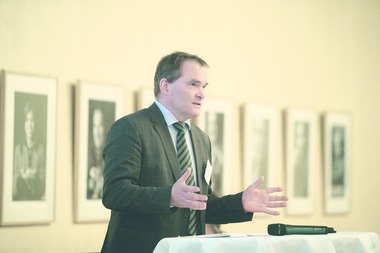vero and IG Bau sign “Social Charter”
 1 Signing of the joint “Social Charter” at the press conference in Hanover
1 Signing of the joint “Social Charter” at the press conference in Hanover
© vero
“A revolutionary, completely new approach that I expressly recommend to other associations of all industries”, is how State Secretary for the Environment Frank Doods described the new “Social Charter”. On 12.07.2022, the joint press conference of vero - the association of the construction and raw materials industry and IG BAU took place. The occasion of the press conference was the signing of the joint “Social Charter”. In it, both sides commit to fair incomes with collective bargaining coverage, co-determined working time models, the avoidance of temporary work, but also to environmental protection and joint political influence, among other things. For vero, the Chief Executive Raimo Benger, the Managing Director Raw Materials and Environment Dr. Stefan Löbens, the Head of Communications and Public Relations Kim Walter as well as the State Chair Nico Steudel were on site.
 2 Raimo Benger, Managing Director vero, in an interview with the media
2 Raimo Benger, Managing Director vero, in an interview with the media
© vero
Raimo Benger, General Manager vero, sees the new “Social Charter” as an opportunity for the construction and raw materials industry to make jobs more secure in times of a shortage of skilled workers and to guarantee good training. He further comments: “Within this new concerted action, one of the central points for the workers is that we want to particularly strengthen the co-determination in the companies”. And this is only one of the 21 points of the “Social Charter”. The strengthening of collective bargaining is also addressed there. “Almost all of our companies are bound by collective agreements,” says Benger “Area-wide agreements with opening clauses are important for social peace.” For the DBG district chair Mehrdad Payandeh, the Social Charter is a “lighthouse project” because it aims at social, economic and ecological sustainability. With the agreement, the building materials industry is giving an answer to the shortage of skilled workers, which is “the number one obstacle to growth”. Payandeh: “The industry is focusing here on innovation, efficiency and productivity.”
“This marks the beginning of a new era in raw material extraction for construction in Lower Saxony: Lower Saxony is producing ‘social sand’ and ‘fair gravel’, so to speak. There is also more sustainability in natural stone,” explained IG-BAU state head Eckhard Stoermer. In Lower Saxony, about 40 million tonnes of sand and gravel are extracted per year from about 400 quarries, which is one sixth of the total German production volume. The annual production of natural stones, which are mainly used in the building materials industry as chippings and gravel, is 10 million tonnes.
According to Nico Steudel, regional chairman of Lower Saxony vero, the industry is pursuing another goal. “It is a matter of averting an imminent shortage of supply for goods that are becoming more expensive anyway,” warns the managing director of the Rhein-Umschlag group of companies from Oldenburg. Due to expiring permits, he says, the construction industry in Lower Saxony is threatened with a shortage of building materials. “The raw material is there, but we will not be able to mine it. We will have a problem on the permit side,” Steudel said. According to the vero state director, the situation is serious. “At one third of the sand and gravel plants, the stocks for which there is a permit to mine will not last 5 years. Another third have approved stocks of 10 years at most,” Steudel said. In the natural stone industry, one in six operations would run out of resources by 2027. “A policy that promises people housing must also approve the extraction of raw materials,” the national chair demands.
All in all, the “Social Charter” stands out as a unique and revolutionary project, which has never existed in this form before! This is shown above all by the fact that it has already been put into practice. IG BAU and DGB have already successfully supported vero in Lower Saxony in the past in positively influencing raw material areas within the regional planning programme. This success of the “Social Charter” was also reflected in the media response - both in the press and on television.





